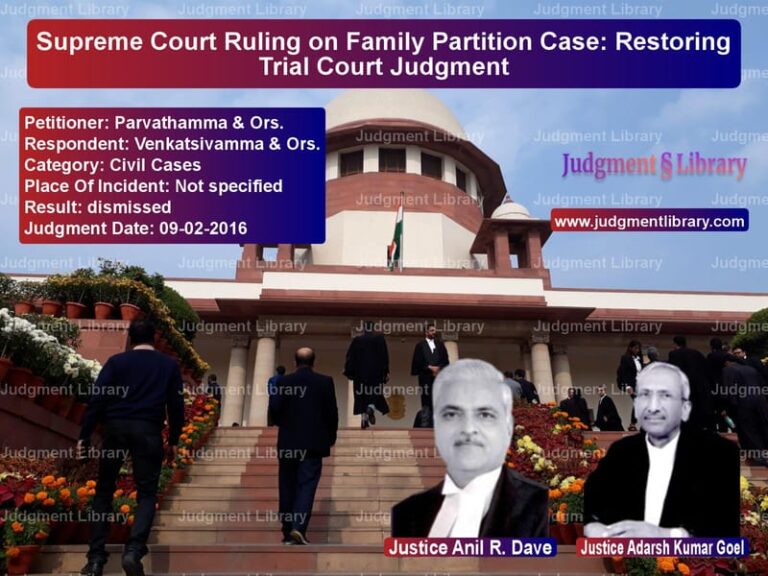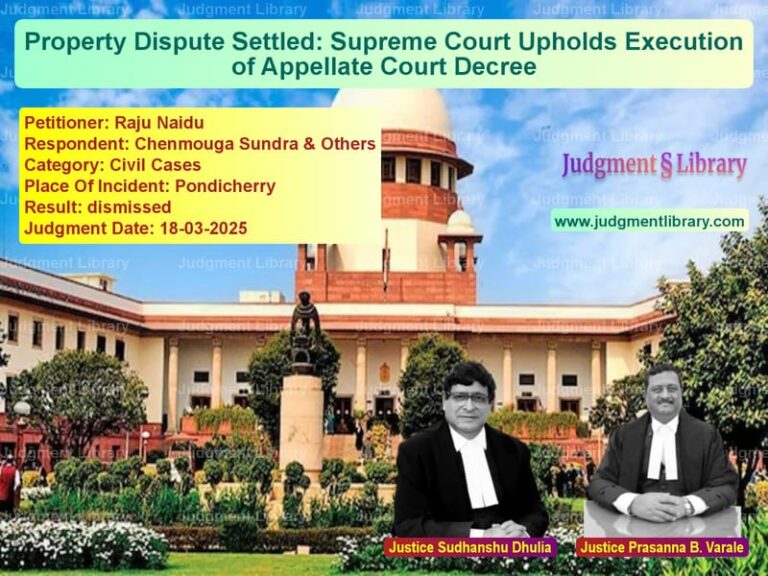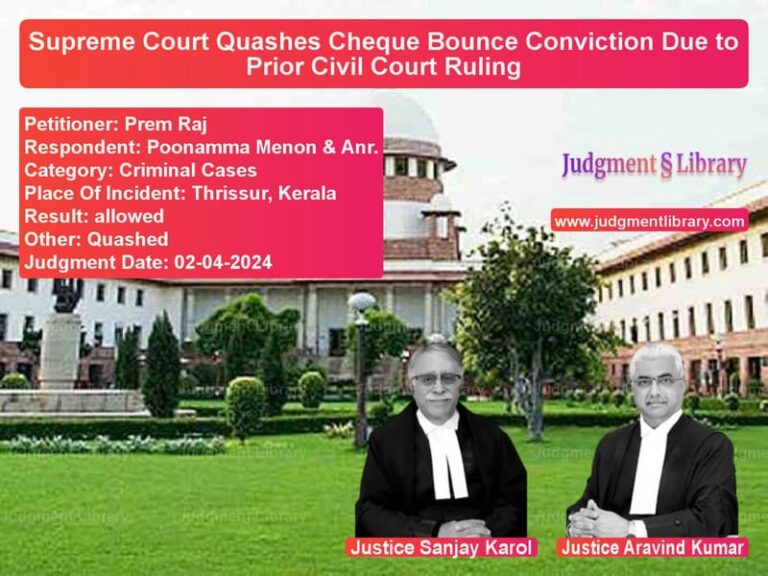Applicability of SARFAESI Act on Co-operative Banks: Supreme Court’s Landmark Judgment
The legal dispute in Pandurang Ganpati Chougule vs. Vishwasrao Patil Murgud Sahakari Bank Limited revolved around the fundamental question of whether the SARFAESI Act, 2002, could be applied to co-operative banks. This case brought into focus the constitutional and legislative framework governing banking institutions in India, particularly concerning the legislative competence of Parliament under Entry 45 of List I in the Seventh Schedule of the Constitution.
The judgment, delivered by the Supreme Court of India, examined the conflicting interpretations arising from previous cases, notably Greater Bombay Co-operative Bank Ltd. vs. United Yarn Tex (P) Ltd. and Delhi Cloth & General Mills Co. Ltd. vs. Union of India. The Court had to determine whether the provisions of the SARFAESI Act extended to co-operative banks, which are regulated under the Banking Regulation Act, 1949, and governed by the Reserve Bank of India.
Background of the Case
The case originated when the petitioner, Pandurang Ganpati Chougule, challenged the notices issued under the SARFAESI Act by Vishwasrao Patil Murgud Sahakari Bank Limited. The petitioner contended that co-operative banks do not fall within the definition of ‘banking company’ as per the Banking Regulation Act, and therefore, the enforcement provisions of the SARFAESI Act should not apply to them.
The respondent, however, argued that the legislative amendments made to the Banking Regulation Act and the SARFAESI Act empowered co-operative banks to take action under the Act. The case reached the Supreme Court after conflicting decisions were rendered by different High Courts on the same legal issue.
Arguments of the Petitioner
The petitioner raised several constitutional and legal objections, emphasizing the following points:
- Legislative Competence: It was argued that co-operative societies fall under Entry 32 of List II (State List) and are outside the legislative purview of Parliament. The petitioner relied on previous rulings, which held that co-operative banks were fundamentally different from commercial banks.
- Definition of Banking: The petitioner submitted that ‘banking’ under Entry 45 of List I should be interpreted strictly, and that co-operative banks primarily function as co-operative societies rather than as banks in the commercial sense.
- Violation of State Autonomy: The petitioner contended that bringing co-operative banks under the SARFAESI Act encroached upon the powers of State legislatures and disrupted the federal structure.
Arguments of the Respondent
The respondent, Vishwasrao Patil Murgud Sahakari Bank Limited, countered the arguments with the following points:
- Regulatory Framework: The respondent argued that co-operative banks are already subject to regulation under the Banking Regulation Act, 1949, which is a central legislation. Therefore, they should be treated on par with other financial institutions covered by the SARFAESI Act.
- Need for Efficient Debt Recovery: The respondent stressed the importance of extending the SARFAESI Act to co-operative banks to enable them to recover dues from defaulters without lengthy litigation.
- Precedents and Legislative Amendments: The respondent relied on past judgments and statutory amendments that brought co-operative banks within the ambit of financial regulation.
Supreme Court’s Analysis
The Supreme Court analyzed the legislative framework governing banking and finance, particularly the interplay between the Banking Regulation Act and the SARFAESI Act. The Court observed:
- ‘Banking’ is a term that has evolved over time and is not confined to its traditional definition.
- The provisions of the SARFAESI Act are intended to streamline the recovery process for all financial institutions, including co-operative banks.
- The legislative history and amendments indicate that Parliament intended to bring co-operative banks under the purview of the SARFAESI Act.
Key Observations from the Judgment
The Supreme Court made several significant observations in its ruling:
“The word ‘banking’ has never had any static meaning, and the only meaning will be the common understanding of men and the established practice about banking.”
“Co-operative banks, despite being structured as co-operative societies, engage in banking activities, accept deposits, and provide credit facilities. They, therefore, fall within the regulatory scope of the SARFAESI Act.”
Conclusion
The Supreme Court dismissed the petitioner’s plea, upholding the applicability of the SARFAESI Act to co-operative banks. It ruled that Parliament has the legislative competence to regulate banking activities under Entry 45 of List I and that the SARFAESI Act’s provisions validly extend to co-operative banks.
This judgment has far-reaching implications for the financial sector, particularly for co-operative banks, as it clarifies their legal standing and empowers them to take swift action against loan defaulters under the SARFAESI framework.
The ruling reinforces the authority of the SARFAESI Act and ensures that co-operative banks have the same enforcement powers as other banking institutions, thereby strengthening the financial sector’s ability to recover bad debts efficiently.
Petitioner Name: Pandurang Ganpati Chougule.Respondent Name: Vishwasrao Patil Murgud Sahakari Bank Limited.Judgment By: Justice Arun Mishra.Place Of Incident: India.Judgment Date: 05-05-2020.
Don’t miss out on the full details! Download the complete judgment in PDF format below and gain valuable insights instantly!
Download Judgment: Pandurang Ganpati Ch vs Vishwasrao Patil Mur Supreme Court of India Judgment Dated 05-05-2020.pdf
Direct Downlaod Judgment: Direct downlaod this Judgment
See all petitions in Constitution Interpretation
See all petitions in Legislative Powers
See all petitions in Public Interest Litigation
See all petitions in Judgment by Arun Mishra
See all petitions in dismissed
See all petitions in supreme court of India judgments May 2020
See all petitions in 2020 judgments
See all posts in Constitutional Cases Category
See all allowed petitions in Constitutional Cases Category
See all Dismissed petitions in Constitutional Cases Category
See all partially allowed petitions in Constitutional Cases Category







